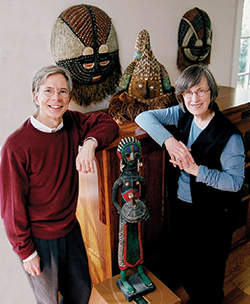HIGHLIGHTS:
Professor of Law; joined California Western in 1990
Director, Louis M. Brown Program in Preventive Law; Coordinator, National Center for Preventive Law
Ph.D. Cambridge University; J.D. Cornell University; B.A. Tulane University
Courses Taught: Civil Procedure I & II; Contracts I & II; Problem Solving & Preventive Law; Problem Solving Skills & Theory
Profile Page: Tom Barton

As Tom Barton contemplated his next steps in life as a senior at Tulane University in 1971, he looked at two divergent career paths. The first was to pursue a graduate degree in broadcasting and film. The second was law school.
"I remember going to Cornell University for an interview at the law school. I don't think I'd ever met a lawyer, and I'd never been to the East Coast," he recalls. "As I sat in a room waiting for the interview, I picked up some of the law reviews. On one level, they were completely inaccessible, but they posed an intellectual challenge for me."
That was the beginning of Barton's fascination with the law. By the end of his first year at Cornell, he was convinced he wanted to teach at a law school. He graduated from Cornell and worked for two years at a medium-sized firm in Rochester, N.Y., focusing on taxation and anti-trust. And he began the process of looking at Ph.D. programs in law so he could fulfill his ambition of becoming a law professor.
"No school in the United States offered a Ph.D. program in the law at that time," says Barton. But there was a superb research-based doctoral program at Cambridge University in England, and Barton applied and was accepted.
His studies at Cambridge laid the foundation for his academic career, which began at West Virginia University and took him to California Western in 1990.
His doctoral thesis, titled "Justiciability: A Theory of Problem Solving," provided him with a framework that has evolved into research on topics ranging from creative problem solving to preventive law.
"Formal legal procedures typically deal with the past, framing issues as yes and no questions," says Barton. "As society and technology change, the law has had to deal with more complex problems."
"During the past two decades, there has been a demand from society for the law to better reflect the way the culture generally solves problems. The result is a sudden explosion of innovation in procedures for resolving legal problems at a level unlike anything that has happened in the last 500 years."
That innovation has come in the form of alternative dispute resolution (ADR) and preventive law. Both of these approaches to resolving issues, says Barton, represent significant departures from the traditional adversarial approach that has characterized the Western legal system.
"Society is demanding quicker and cheaper solutions to legal issues," says Barton. "ADR and preventive law are based more on mutual consent and the rules of evidence are more lax. These alternative approaches are, in many ways, making the law more human."
Barton emphasizes, however, that these new approaches can cause concerns in the legal community. Lawyers and firms are at times questioning how different approaches might affect the bottom line and billable hours. "There is some reluctance to accept change," he says. "Lawyers have traditionally been trained as zealous advocates, and the evolution of the law toward problem solving and preventive law focuses more on the lawyer as advisor or counselor."
As Barton teaches a range of legal courses at California Western, he emphasizes to students that they must have a core understanding of the tradition of the law in order to be successful.
"Our students have to master the fundamentals of traditional legal procedures and skills," he says. "At the same time, they need to understand the changes in the legal system and problem solving. I tell my students that no single procedure will solve every problem, and they need to always focus on expanding their repertoire of skills."
Outside of the classroom, Barton stays busy playing tennis, exercising, and reading both fiction and non-fiction. "I enjoy my time at home with my wife, who is an excellent cook and wine hobbyist," he says. "We enjoy our golden retriever Honey Bear. She has us well trained as groomers and feeders. She walks us twice every day."